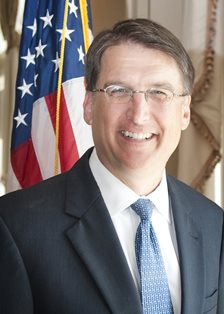
|
(CNN) -- If at first you don't succeed, ride in on a motorcycle.
Conservative legislators in North Carolina trying to get a new restrictive abortion bill passed have done just that.
House committee members refashioned a bill on motorcycle safety into one principally about abortion after the state's governor threatened on Wednesday to veto the anti-abortion measures.
They were previously attached to a bill aimed at keeping foreign laws -- which included Islamic Sharia law -- out of state legal proceedings.
Conservative legislators will submit the new bill for a vote to the state legislature Thursday, CNN affiliate WRAL reported.
Uniting the proposed abortion legislation with a bill about motorcycle safety triggered derisive criticism on social media and spawned the Twitter hash tag #vaginamotorcycle.
"Well, been riding around on my #vaginamotorcycle all night without a helmet," @Duchwela3h posted.
@aayers324 posted an illustration matching the view of a motorcycle from the front with female reproductive anatomy.
She commented: "I can see how NC got confused on this one."
The bill would place requirements on clinics that family planning advocates say would make it hard for them to stay in business. Among the requirements: A doctor must be present when an abortion is being performed.
The bill allows for North Carolina's health department to make temporary new rules for the state's 31 abortion clinics as it sees fit.
It also prohibits government-administered insurance plans, such as those under the Affordable Care Act, to pay for abortions. But it makes exceptions when a pregnancy endangers a woman's life.
A similar but stricter law passed in Mississippi is coming close to shutting down that state's last abortion clinic. Another such law passed in Alabama earlier this year.
These new state laws represent a broader, nationwide assault on a woman's right to choose, said Staci Fox, a Planned Parenthood spokeswoman.
"Bills like these have been introduced in 42 states. This is a whole new level of attack on women's health."
Some of the states that have already passed new laws did so in anticipation of legal challenges and have shored up war chests to fund the battles, she said.
They are prepared to go to court, even to challenge the landmark Supreme Court abortion ruling Roe v. Wade that provides the basic legal framework for abortion in the United States.
Abortion opponents confirm the judicial strategy behind the laws.
Americans United for Life states: "Using our model legislation and our hard-won expertise with abortion clinic regulations, we also intend to provoke future, strategic 'test cases' -- federal and state legal challenges to carefully crafted and selected state laws -- that will serve as vehicles to severely undermine Roe v. Wade and, ultimately, eradicate it from American law."
Planned Parenthood called the legislative contortions a "sneak attack," crying foul over the lack of public notice about the bill.
"The public and even many legislators on the committee only learned this was a possibility ... three minutes before the committee was to meet," the group said in a statement Wednesday.
But conservative legislators had already put their opposition on alert, when they tried the same maneuver with other legislation. And the anti-abortion measures were not well-hidden in either case.
When attaching it to the motorcycle safety measures, they placed it at the top of the bill, which they renamed "Health and Safety Law Changes." The motorcycle safety measures dropped to the bottom of the bill.
Gov. Pat McCrory, a Republican, vowed to veto the abortion legislation the first time it came up.
In his campaign, he had promised not to restrict abortion in North Carolina, and abortion-rights advocates lobbied to hold him to his word.
McCrory warned in a statement that the legislation was unacceptable without significant changes, but he noted in his objections "that major portions of the bill are of sound (principle) and value."
The language of the bill was reworded somewhat the second time around. It now says the health department should make rules without "unduly restricting access."
McCrory could still veto.
But if he does, both houses of the state legislature have enough conservative votes to override it.





















































































































































































































































































































































